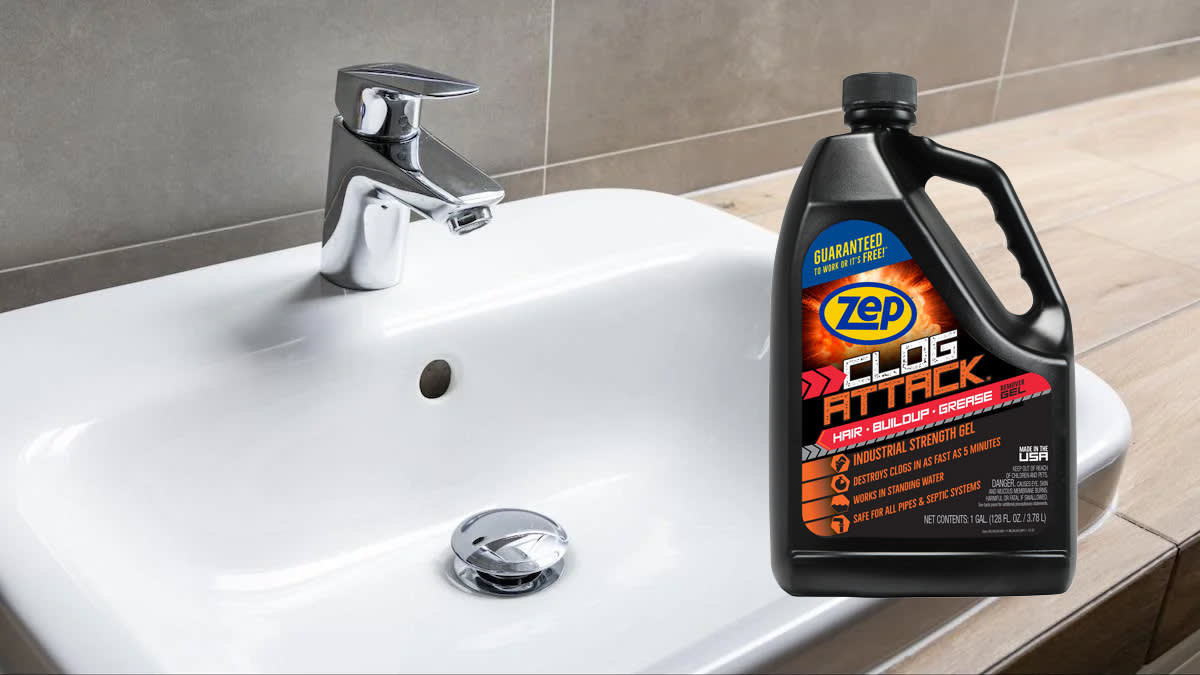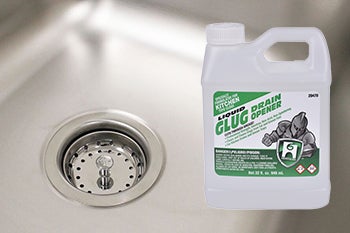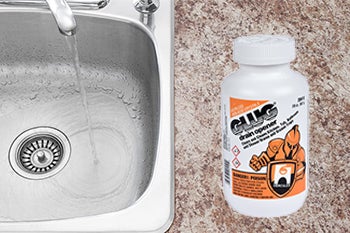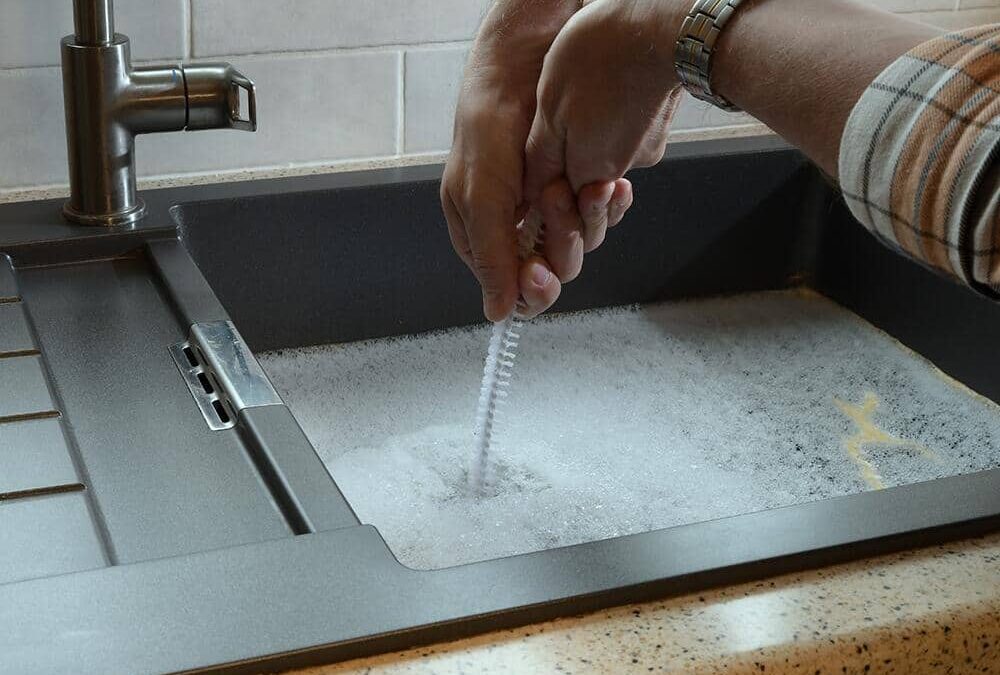Are you tired of dealing with a clogged kitchen sink that just won’t budge? You’re not alone.
A blocked sink can disrupt your daily routine and lead to frustrating delays in meal prep and clean-up. You might find yourself standing there, staring at the murky water, wondering which drain cleaner will finally do the trick. This isn’t just about finding a quick fix; it’s about choosing a solution that actually works.
Imagine the satisfaction of watching that stubborn clog disappear, leaving you with a sink that drains smoothly every time. We’ll dive into the world of drain cleaners, comparing the options to discover which one truly reigns supreme for your kitchen sink. Get ready to say goodbye to those pesky blockages and hello to a hassle-free kitchen experience.

Credit: ky-pd.com
Factors To Consider
Choosing the best drain cleaner for kitchen sinks involves checking the type of clog and cleaner’s safety. Consider the environmental impact, effectiveness, and ease of use. Read labels carefully for non-toxic ingredients to protect pipes and health.
Cleaning a clogged kitchen sink can feel like a daunting task. But choosing the right drain cleaner doesn’t have to be a complicated decision. By considering a few key factors, you can tackle those stubborn clogs effectively and safely.Type Of Clog
Before selecting a drain cleaner, it’s crucial to identify the type of clog you’re dealing with. Is it grease, food particles, or hair? Each type requires a different approach. Grease might need a cleaner that dissolves fatty deposits, while food particles might respond to a more abrasive solution. Understanding the clog type can save you time and money. Imagine pouring a gallon of drain cleaner down the sink, only to find it ineffective because it wasn’t designed for your specific issue. Get to know your clog to tailor your solution effectively.Chemical Vs. Natural Cleaners
The debate between chemical and natural cleaners is ongoing. Chemical cleaners can be powerful and fast-acting, but they might harm your pipes in the long run. Natural cleaners, like baking soda and vinegar, are gentler but may take longer to work. Have you ever thought about the environmental impact of your cleaning choice? Chemical cleaners can be harsh on the ecosystem, while natural options are more eco-friendly. Which matters more to you: speed or sustainability?Safety Concerns
Safety should be top of mind when choosing a drain cleaner. Chemical cleaners can be hazardous if inhaled or touched. Always wear gloves and ensure proper ventilation. On the other hand, natural cleaners are safer but can still cause irritation if handled improperly. Consider your household. If you have pets or children, safety becomes even more critical. A mishap with a chemical cleaner could lead to a trip to the ER. Is it worth the risk? Prioritize safety to protect your loved ones and yourself. In the journey of finding the best drain cleaner for your kitchen sink, weighing these factors can guide you to a smart choice. What matters most to you: effectiveness, environmental impact, or safety?
Credit: www.oatey.com
Chemical Drain Cleaners
Choosing the best drain cleaner for a kitchen sink involves considering effectiveness and safety. Liquid cleaners often dissolve grease and food particles efficiently. Gel-based options cling to clogs longer, making them effective for stubborn blockages.
Chemical drain cleaners are often the go-to solution for stubborn kitchen sink clogs. These powerful liquids or gels can dissolve most obstructions, from grease buildup to food particles. If you’ve ever faced a stubborn clog, you know the frustration of watching water pool in your sink. Chemical drain cleaners promise quick relief, but how do you choose the best one for your needs?Popular Brands
Many popular brands dominate the chemical drain cleaner market. Drano is a household name, often praised for its effectiveness. Liquid-Plumr is another favorite, offering specialized formulations for various types of clogs. Green Gobbler combines eco-friendly ingredients with the power of traditional chemical cleaners. Each brand has its champions, but effectiveness can vary based on the nature of the clog and the plumbing system.Pros And Cons
Chemical drain cleaners offer the advantage of speed and ease of use. You pour them in, wait, and the clog often disappears. However, they can be harsh on pipes, especially older plumbing systems. Frequent use may lead to corrosion over time. Some cleaners emit strong fumes that can be unpleasant or even harmful if inhaled. Always weigh the immediate benefits against potential long-term damage.Best Situations For Use
Chemical drain cleaners shine in certain scenarios. They are ideal for minor clogs caused by grease or soap buildup. If you’re dealing with organic matter like food scraps, these cleaners can be effective. However, for more complex issues like tree roots or severe blockages, they may not suffice. In such cases, professional plumbing intervention might be needed. Are you facing a clog that seems unbeatable? Consider your options carefully, and remember that not all clogs require a chemical solution.Enzyme-based Cleaners
Enzyme-based cleaners offer a natural solution for kitchen sink drains. Their active ingredients break down organic matter effectively, reducing clogs and odors. Choose these cleaners to maintain a fresh and clear kitchen sink without harsh chemicals.
Enzyme-based cleaners offer an innovative solution for clogged kitchen sinks. These cleaners use natural enzymes to break down organic matter. Unlike harsh chemicals, they are gentle on pipes and the environment. Many homeowners prefer them for their eco-friendly nature. They are effective in dealing with grease, food particles, and other common kitchen debris.How They Work
Enzyme-based cleaners contain proteins that digest organic waste. They attack the buildup of food particles and grease. This process clears the blockage without damaging the pipes. The enzymes continue working for hours, providing long-lasting results. They transform waste into liquid, which easily washes away.Advantages
These cleaners are environmentally friendly. They use natural ingredients instead of harsh chemicals. This makes them safe for your pipes and septic systems. They are non-corrosive, ensuring pipes remain intact. They are also effective against tough grease clogs. Many find them safer to use than chemical alternatives.Recommended Products
Several enzyme-based drain cleaners are popular among homeowners. Biokleen’s Bac-Out Drain Care Gel is a top choice. It uses live enzymes to clear clogs and deodorize drains. Earthworm Family-Safe Drain Cleaner is another favorite. It’s safe for kids and pets, yet effective on kitchen sink clogs. Green Gobbler Enzyme Drain Cleaner also stands out. It targets grease and food particles with powerful enzymes.Homemade Solutions
Discover effective homemade drain cleaners for kitchen sinks. Baking soda and vinegar provide a powerful solution for clearing blockages. Also, try using hot water mixed with salt to tackle stubborn clogs. These natural methods can keep your kitchen sink flowing smoothly without harsh chemicals.
When your kitchen sink clogs, reaching for a chemical drain cleaner might seem like the easiest solution. However, homemade remedies can be just as effective and are often more environmentally friendly. Plus, they use ingredients you likely already have in your pantry, saving you both time and money. So, why not give a homemade solution a try before resorting to harsh chemicals?Ingredients Needed
To whip up a powerful homemade drain cleaner, you’ll need a few basic ingredients: – Baking Soda: Known for its cleaning power, baking soda helps break down grime. – White Vinegar: This common household item reacts with baking soda to dissolve clogs. – Boiling Water: The heat helps to further dislodge stubborn blockages. – Salt: Optional, but it can boost the effectiveness of the solution. These items are simple, yet they pack a punch when it comes to unclogging drains.Step-by-step Guide
Ready to get started? Follow these straightforward steps: 1. Remove any standing water from the sink to ensure the solution reaches the clog. 2. Pour 1 cup of baking soda down the drain. 3. Add 1 cup of white vinegar immediately after. You’ll hear fizzing—this means it’s working! 4. Wait for 15-20 minutes to let the mixture break down the blockage. 5. Boil a kettle of water and carefully pour it down the drain. 6. Repeat the process if necessary for tough clogs. This simple method can often clear clogs without any additional tools.Effectiveness
You might wonder if such a simple solution can really work. The answer is yes, but with a caveat. While this method is effective for minor clogs caused by grease or soap buildup, it may not work for more severe blockages like those caused by food waste or foreign objects. In my experience, using this solution regularly can prevent clogs from forming. You could treat your drains once a month to keep them free-flowing. Have you ever tried homemade drain cleaners? How did they work for you? Give this eco-friendly method a go and you might find it to be a surprisingly effective solution.Eco-friendly Options
Choosing the right eco-friendly drain cleaner for your kitchen sink can make a big difference. Natural enzyme-based cleaners break down food particles effectively. They help keep the plumbing system clean without harming the environment.
Eco-friendly drain cleaners are gaining popularity. More people want to protect the environment. These cleaners are safe for the planet and your health. They use natural ingredients that break down easily. Choosing eco-friendly options helps the earth stay healthy.Benefits For Health And Environment
These cleaners avoid harmful chemicals. They reduce the risk of skin irritation. Eco-friendly cleaners are gentle on septic systems. They do not harm aquatic life. Using them keeps water sources safe. They help maintain a balanced ecosystem. Your family stays healthy with less exposure to toxins.Top Eco-friendly Brands
Several brands offer effective natural drain cleaners. Biokleen is popular for its plant-based formula. It cleans without harsh chemicals. Another choice is Earth Enzymes. It uses enzymes to clear clogs safely. Seventh Generation provides a biodegradable cleaner. It is gentle yet effective for kitchen sinks. All these brands focus on sustainability. They ensure minimal environmental impact. Choose these for a cleaner, safer home.Professional Services
Choosing the right drain cleaner can simplify kitchen sink maintenance. Gel-based cleaners dissolve tough clogs with precision. Enzyme cleaners are eco-friendly and effective for routine cleaning.
When it comes to dealing with a clogged kitchen sink, sometimes the best solution isn’t found in a bottle of drain cleaner. Professional services can offer expertise and advanced tools that ensure a thorough job. While it might seem daunting to bring in a plumber, their skills can save you time and prevent further damage.When To Call A Plumber
Have you ever spent hours trying to unclog your sink, only to find the problem reoccurs? That’s when it’s time to call a plumber. Persistent clogs, multiple clogged drains, or foul odors are signs that professional help is needed. An experienced plumber can quickly diagnose the issue. They use tools like snake augers and hydro jets, which are more effective than DIY methods. Plus, they can spot potential issues before they escalate.Cost Vs. Diy
The cost of hiring a plumber might make you hesitate. But consider the potential expenses of a DIY attempt gone wrong. Buying the wrong drain cleaner or damaging pipes can lead to costly repairs. Professional services often come with a guarantee. This means if the issue recurs, they will fix it at no extra charge. While DIY might seem cheaper upfront, professionals can save money in the long run by ensuring the job is done right the first time. Isn’t it better to have peace of mind knowing your kitchen sink is in expert hands? Opting for professional services might just be the smartest choice when faced with stubborn clogs.Maintenance Tips
Keeping your kitchen sink in top shape requires more than just choosing the right drain cleaner. Consistent maintenance can prevent clogs and prolong the life of your pipes. But how exactly can you ensure your sink stays clean and functional?
Preventative Measures
Prevention is always better than cure. Start by being mindful of what goes down your drain. Avoid pouring grease, coffee grounds, and fibrous vegetables like celery. These can lead to stubborn clogs.
Consider using a drain strainer. This simple tool can catch food particles and debris before they cause problems. It’s a small investment with big benefits for your kitchen.
Regular Cleaning Schedule
Establish a routine for cleaning your drain. A weekly flush with hot water can help dissolve grease build-up. This keeps your pipes clear and reduces the chance of clogs.
Once a month, try using a mixture of baking soda and vinegar. Pour half a cup of baking soda followed by half a cup of vinegar down the drain. It’s a natural cleaner that fizzes away grime and odors.
Have you ever noticed a strange smell coming from your sink? Regular cleaning can eliminate unpleasant odors. It’s more than just maintaining appearances; it’s about creating a pleasant kitchen environment.
Implementing these maintenance tips can save you from future headaches. After all, isn’t it better to prevent a problem than to fix it later? Your sink is an essential part of your kitchen, so treat it with care.

Credit: www.oatey.com
Frequently Asked Questions
What Is The Best Drain Cleaner For Kitchen Sinks?
The best drain cleaner for kitchen sinks is often a gel-based formula. Gels can cling to clogs better than liquids. Products containing enzymes are great for breaking down organic matter. It’s essential to choose a cleaner safe for pipes and environmentally friendly.
Can Enzyme-based Cleaners Work In Kitchen Sinks?
Yes, enzyme-based cleaners can effectively work in kitchen sinks. They break down organic debris without harsh chemicals. These cleaners are safe for pipes and environmentally friendly. Regular use can prevent future clogs and maintain a smooth flow. They are ideal for homes with septic systems.
Are Chemical Drain Cleaners Safe For Pipes?
Chemical drain cleaners can be harsh on pipes if used frequently. They may corrode metal pipes over time. It’s important to follow instructions carefully. Consider using natural or enzyme-based alternatives for regular maintenance. These are safer and gentler on plumbing systems.
How Often Should I Clean My Kitchen Sink Drain?
Cleaning your kitchen sink drain monthly is recommended to prevent clogs. Regular maintenance can help avoid buildup of food particles and grease. Using a mild cleaner or homemade solution can help maintain flow. Regular cleaning ensures optimal performance and prolongs the lifespan of your plumbing.
Conclusion
Choosing the right drain cleaner is key for a clear kitchen sink. Different products offer varied solutions. Consider your needs and sink type. Some cleaners are eco-friendly, reducing harm to pipes and the environment. Others tackle tough clogs quickly. Always read labels carefully.
Safety matters, especially with chemical cleaners. Regular maintenance can prevent major blockages. A little effort keeps your sink draining smoothly. Experiment with options until you find the best fit. A clean kitchen starts with a clear sink. Keep it simple, safe, and effective for hassle-free cooking and cleaning.

As the chief content writer, Hassan Al Sarker works as a professional kitchen-based content creator at Kitchen Liker.
In addition to reviewing the content published on Kitchen Liker, he ensures that it is accurate, relevant, and helpful. As a result, all the reviews and information published at Kitchen Liker are neutral and userfriendly.
Hassan Al Sarker has a bachelor’s degree in Hotel and Tourism Management From the Newyork University. Before joining Kitchen Liker, he was a contributor at Kitchen Club, United States.

